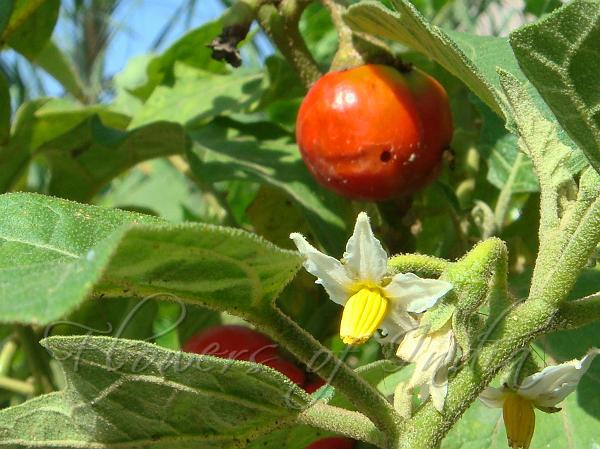|
| Bitter Tomato |
|

|

| File size | 706012 |
| Original date | 5/24/08 2:27 PM |
| Resolution | 2048 x 1536 |
| Flash | Flash did not fire, auto |
| Focal length | 6.33mm |
| Exposure time | 1/250s |
| Aperture | 5.6 |
| Focus Distance | |
| Metering Mode | Multi-segment |
| Camera make | SONY |
| Camera model | DSC-T20 |
| Sensor type |
|
|
|
|
Photo: |
Botanical name: Solanum aethiopicum Family: Solanaceae (Potato family)
Synonyms: Solanum integrifolium, Solanum undatum, Solanum gilo
Synonyms: Solanum integrifolium, Solanum undatum, Solanum gilo
Bitter Tomato is a perennial herb growing up to 70
cm tall, velvet-hairy with stalked or stalkless, 5-9-rayed star-shaped
hairs. Stem and branches are prickly; prickles 2-5 mm, 1-2 mm broad at
base, straight or slightly curved. Upper leaves are often unequal
paired; leaf-stalk 2-7 cm; leaf blade ovate to oblong-ovate, 10-20 x
6-14 cm, with mixed simple and many-rayed hairs below, veins often with
subulate prickles 3-7 mm, irregularly sinuate-parted, tip tapering or
blunt. Flowers are borne in few flowered, racemose clusters.
Flower-cluster-stalk is 1-1.5 cm. Flowers are 5-merous. Flower-stalk is
5-12 mm, with prickles 0.2-2 mm. Calyx is bell-shaped; sepals slightly
unequal, ovate to ovate-lanceshaped, 5-7 × 3-4 mm. Flower are white or
slightly purplish, star-shaped or star-shaped-rotate, 1.5-2.5 cm in
diam.; limb about 6.5 mm. Filaments are 0.5-1 mm, hairless; anthers
lanceshaped-elliptic, 4-5 × 0.7-1 mm, notched at tip and base. Ovary
4-8-locular. Style 5.7-7.5 mm. Fruit is orange or red, 1.5-3 cm in
diameter, superficially resembling a tomato, often longitudinally
4-6-grooved. Seeds are kidney-shaped, 2-3.5 mm in diameter. It is a
popular vegetable in north-east India. Bitter Tomato is probably native
to Africa, cultivated in NE India.
Medicinal uses: Medicinal applications include
the use of roots and fruits as a carminative [dispelling gas from
flatulence] and sedative, and to treat colic and high blood pressure;
leaf juice as a sedative to treat uterine complaints; an alcoholic
extract of leaves as a sedative, anti-emetic [nausea or vomiting] and
to treat tetanus after abortion; and crushed and macerated fruits as an
enema.
Medicinal applications include
the use of roots and fruits as a carminative [dispelling gas from
flatulence] and sedative, and to treat colic and high blood pressure;
leaf juice as a sedative to treat uterine complaints; an alcoholic
extract of leaves as a sedative, anti-emetic [nausea or vomiting] and
to treat tetanus after abortion; and crushed and macerated fruits as an
enema.
Medicinal uses:
 Medicinal applications include
the use of roots and fruits as a carminative [dispelling gas from
flatulence] and sedative, and to treat colic and high blood pressure;
leaf juice as a sedative to treat uterine complaints; an alcoholic
extract of leaves as a sedative, anti-emetic [nausea or vomiting] and
to treat tetanus after abortion; and crushed and macerated fruits as an
enema.
Medicinal applications include
the use of roots and fruits as a carminative [dispelling gas from
flatulence] and sedative, and to treat colic and high blood pressure;
leaf juice as a sedative to treat uterine complaints; an alcoholic
extract of leaves as a sedative, anti-emetic [nausea or vomiting] and
to treat tetanus after abortion; and crushed and macerated fruits as an
enema. | Identification credit: Thingnam Sophia | Photographed in Imphal, Manipur. |
• Is this flower misidentified? If yes,